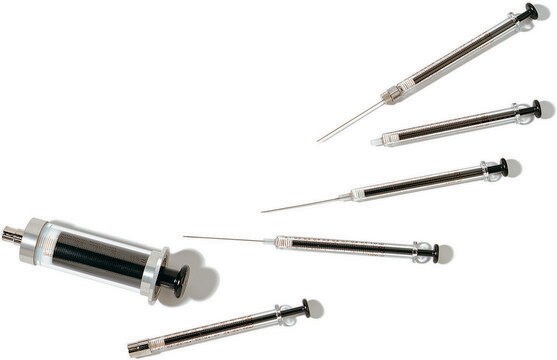20999
Hamilton® syringe, 1000 series GASTIGHT®, PTFE luer lock
1005TLL, PTFE Luer lock, volume 5 mL, needle size (not included)
Sign Into View Organizational & Contract Pricing
All Photos(2)
About This Item
UNSPSC Code:
41122001
eCl@ss:
32070500
Recommended Products
material
PTFE Luer lock
needle size
(not included)
agency
EPA (designed for analyzing drinking water samples)
suitable for EPA 601
packaging
pkg of 1 ea
manufacturer/tradename
Hamilton 81520
needle L
, n/a
volume
5 mL
fitting
luer lock (without slots)
compatibility
for use with purge and trap (US EPA)
Looking for similar products? Visit Product Comparison Guide
Related Categories
General description
Hamilton syringe is available in gas-tight type that minimizes the gas exchange in GC analysis. It gives accurate volume delivery. The plunger is mostly unsurpassed. The tip is threaded in a luer lock syringe allowing the needle to be tightly screwed to the tip.
Application
It has been used during HPLC analysis done to measure the efficiency of dielectrophoresis-based single-particle traps to hold polystyrene beads against destabilizing fluid flows. It has also been used in glass capillary microfluidics technique to generate monodisperse microbiogel encapsulations.
Legal Information
GASTIGHT is a registered trademark of Hamilton Co.
Hamilton is a registered trademark of Hamilton Co.
Tekmar is a registered trademark of Tekmar Co.
Choose from one of the most recent versions:
Certificates of Analysis (COA)
Lot/Batch Number
Sorry, we don't have COAs for this product available online at this time.
If you need assistance, please contact Customer Support.
Already Own This Product?
Find documentation for the products that you have recently purchased in the Document Library.
Customers Also Viewed
One-step method for monodisperse microbiogels by glass capillary microfluidics
Jeong, Won-Wook, and Chanjoong Kim
Colloids and Surfaces. A, Physicochemical and Engineering Aspects, 384.1, 268-273 (2011)
Wolf, Don P.
In Vitro Fertilization and Embryo Transfer: A Manual of Basic Techniques, 06-Dec, 192-192 (2012)
Guy, Jeffrey S.
Pharmacology for the Prehospital Professional, 54-54 (2009)
Holding forces of single-particle dielectrophoretic traps.
Voldman, Joel, et al.
Biophysical Journal, 80.1, 531-542 (2001)
Our team of scientists has experience in all areas of research including Life Science, Material Science, Chemical Synthesis, Chromatography, Analytical and many others.
Contact Technical Service





